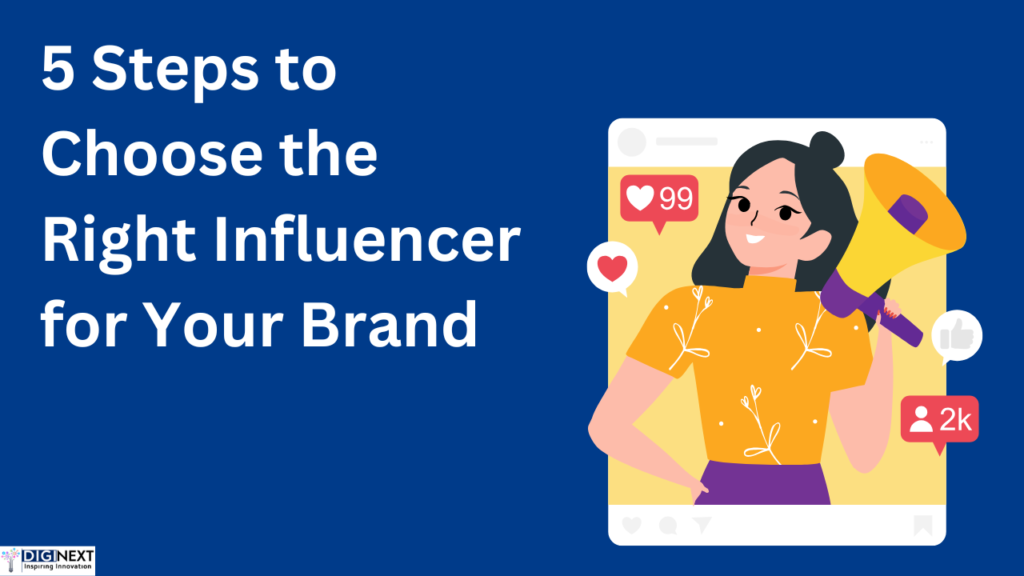5 Steps to Choose the Right Influencer for Your Brand | Influencer Marketing Tips

Influencer marketing is one of the most powerful tools for brands to engage with their target audience in today’s growth-driven digital ecosystem. A well-chosen influencer can elevate your brand, increase engagement, and drive conversions. However, selecting the right influencer requires aligning their values with your brand goals. Below are five actionable steps to help you choose the best influencer for your brand.
Step 1: Identify Your Goals and Target Audience
Before you start searching for influencers, it’s essential to define your marketing goals and understand your target audience. This foundational step sets the stage for a more strategic and successful influencer marketing campaign.
Set Specific Goals
Your goals should be clear and specific. Are you looking to increase brand awareness, drive website traffic, boost sales, or grow your social media following? By setting clear objectives, you can streamline the influencer selection process to meet your needs.
Understand Your Target Audience
Knowing your audience is critical. Analyze their demographics, interests, and preferences. This helps you find influencers whose followers closely match your ideal customer profile. For example, if you’re selling eco-friendly products, working with an influencer who promotes sustainable living and has an audience that values environmental responsibility would be ideal.
Step 2: Research Potential Influencers
A comprehensive research process ensures the influencer’s content and audience align with your brand’s identity and values.
Engage on Social Media Platforms
Platforms like Instagram, YouTube, and LinkedIn are great places to discover potential influencers. Use hashtags, keywords, and industry-specific searches to find influencers who resonate with your brand.
Utilize Influencer Marketing Tools
Tools such as BuzzSumo, Upfluence, and HypeAuditor can simplify the research process by providing insights into an influencer’s reach, engagement rates, and audience demographics. These tools are essential for identifying high-performing influencers who align with your marketing goals.
Evaluate Content Quality
Review the influencer’s content quality, messaging, and tone. Ensure their content resonates with your brand values and audience. Pay attention to the consistency and authenticity of their posts.
Audit Engagement Rates
Instead of focusing solely on follower count, assess engagement metrics such as likes, comments, and shares. A highly engaged audience signifies a loyal following that is more likely to convert.
Step 3: Assess Authenticity and Credibility
Authenticity is the key to successful influencer marketing. Consumers trust influencers who appear genuine and relatable.
Review Previous Collaborations
Check the influencer’s past collaborations to ensure they align with your industry and values. Avoid influencers who endorse brands that don’t resonate with your message, as it could damage your brand’s credibility.
Monitor Engagement Quality
Engagement quality is just as important as quantity. Read through comments and check if the influencer’s followers engage in genuine conversations. A high level of interaction is a positive sign.
Verify Follower Authenticity
To avoid influencers with fake followers, use tools like Social Blade to verify follower authenticity and identify suspicious activity, such as rapid follower growth.
Evaluate Voice Alignment
Ensure the influencer’s tone and style align with your brand’s voice. Whether it’s casual, professional, or humorous, their content should reflect your brand’s personality.
Step 4: Align Goals and Values
The most successful influencer partnerships go beyond transactions; they’re collaborations built on shared goals and values.
Discuss Campaign Objectives
Before finalizing a partnership, discuss your campaign’s goals, expectations, and deliverables to ensure alignment. A mutual understanding of the campaign’s direction will lead to a more successful partnership.
Collaborate Creatively
Involve the influencer in the creative process. Their insights can help refine your campaign to better connect with their audience, leading to more effective results.
Match Brand Values
Choose influencers who genuinely align with your brand values. When an influencer believes in your product or service, their enthusiasm is more likely to resonate with their audience. For instance, a fitness brand launching a new supplement should collaborate with an influencer who has a passion for health and wellness, rather than one motivated solely by compensation.
Step 5: Measure and Optimize Results
Tracking the performance of your influencer marketing campaign is crucial for refining your strategy and ensuring continued success.
Set Key Performance Indicators (KPIs)
Define clear KPIs such as engagement rate, website traffic, conversion rate, or ROI to measure the success of your campaign.
Monitor Campaign Performance
Use tools like Google Analytics, Instagram Insights, or Bitly to track your campaign’s progress. Continuously monitor performance and adjust your strategy as needed.
Gather Feedback
After the campaign ends, ask the influencer for feedback on what worked well and areas for improvement. This valuable input can inform future collaborations.
Evaluate Long-term Impact
Analyze how the campaign has contributed to your brand’s growth and customer loyalty. If the results are positive, consider developing a long-term relationship with the influencer for future campaigns.
Tips for Success in Influencer Marketing
- Build Relationships: Approach influencers as long-term partners, not just short-term promoters. Building strong, lasting relationships leads to better collaboration and brand advocacy.
- Be Transparent: Clearly define terms, expectations, and compensation to avoid misunderstandings and ensure a smooth partnership.
- Diversify Your Portfolio: Work with a mix of micro, macro, and nano influencers to target different audience segments and expand your reach.
- Stay Updated: Keep an eye on emerging influencers and trends to stay ahead of the curve in a constantly evolving market.
Conclusion
Choosing the right influencer for your brand is a strategic process that involves careful planning, research, and evaluation. By following these five steps—defining your goals, researching influencers, assessing authenticity, aligning values, and measuring results—you can create impactful partnerships that drive brand growth. The right influencer doesn’t just promote your product—they become an advocate for your brand, helping you foster trust and loyalty among their engaged audience.
